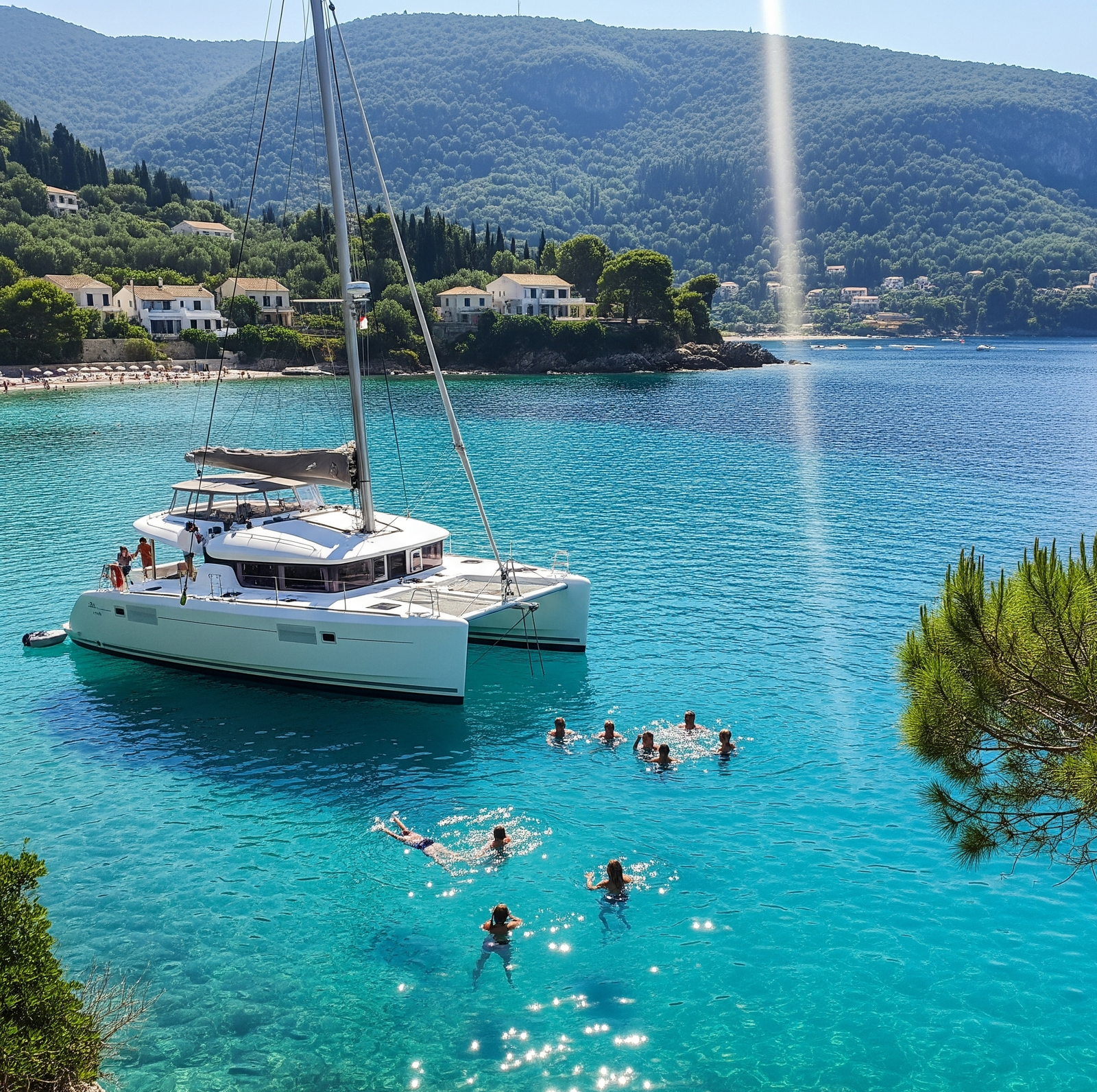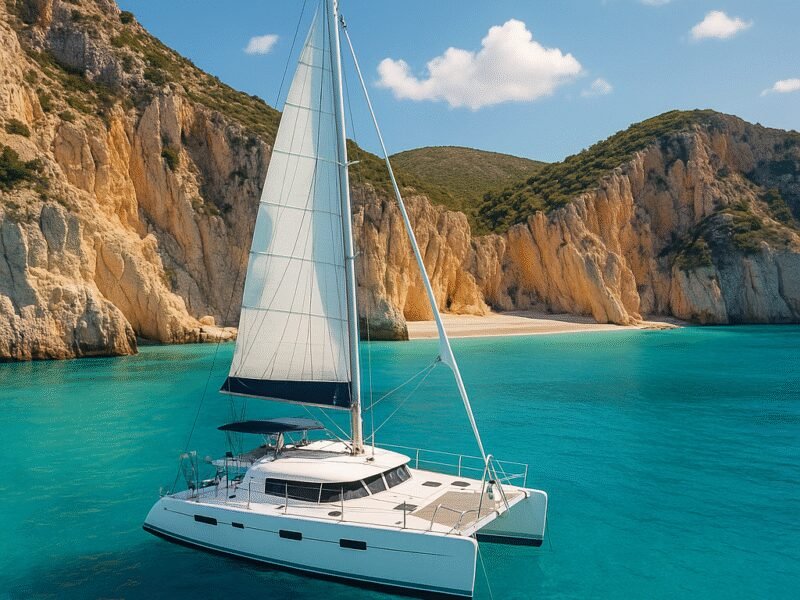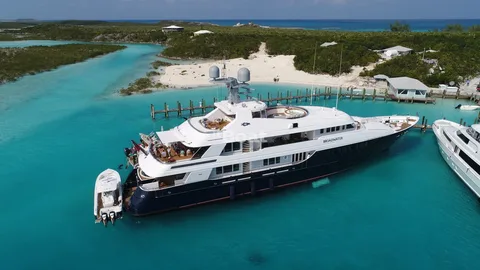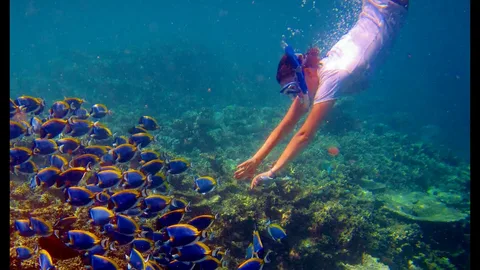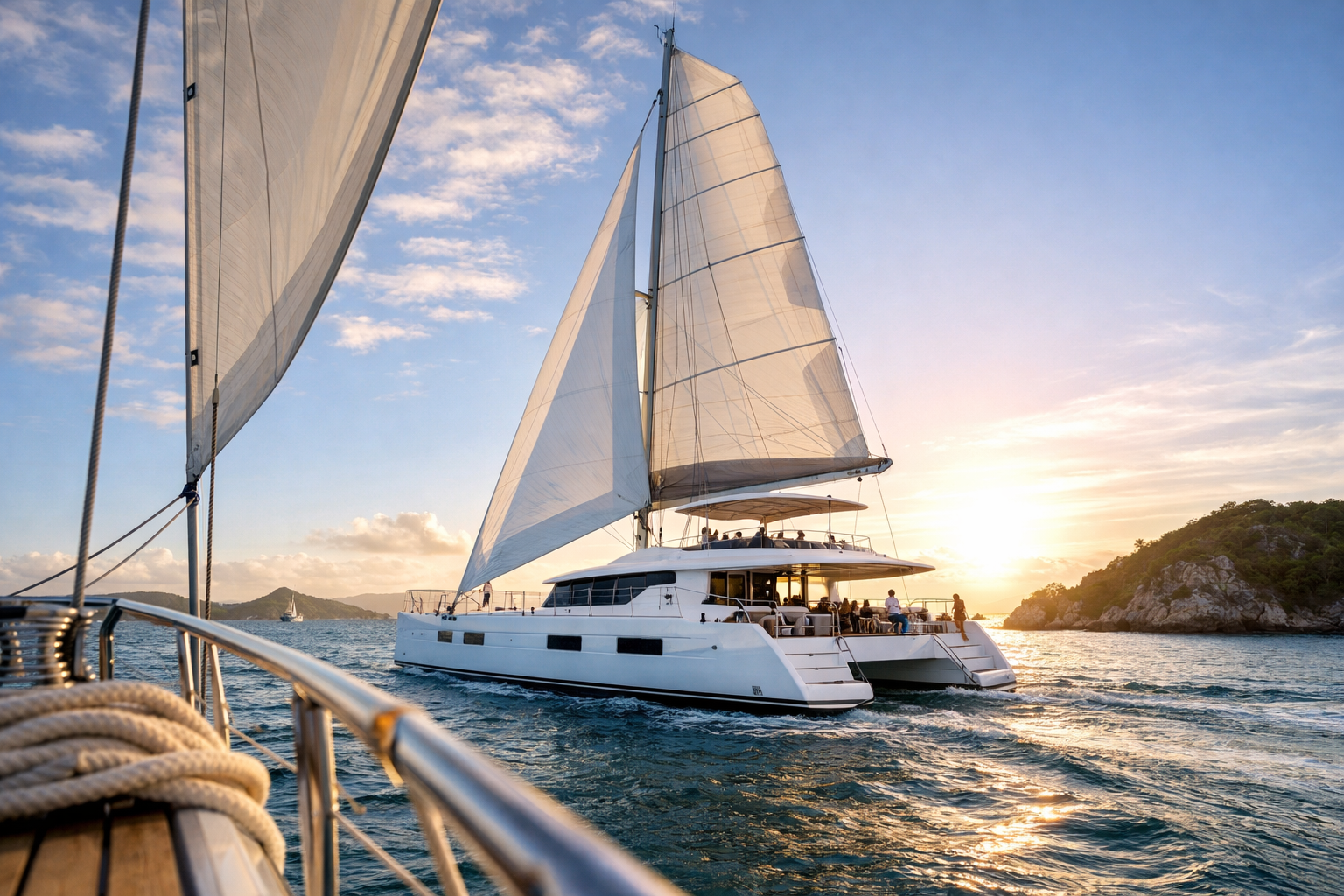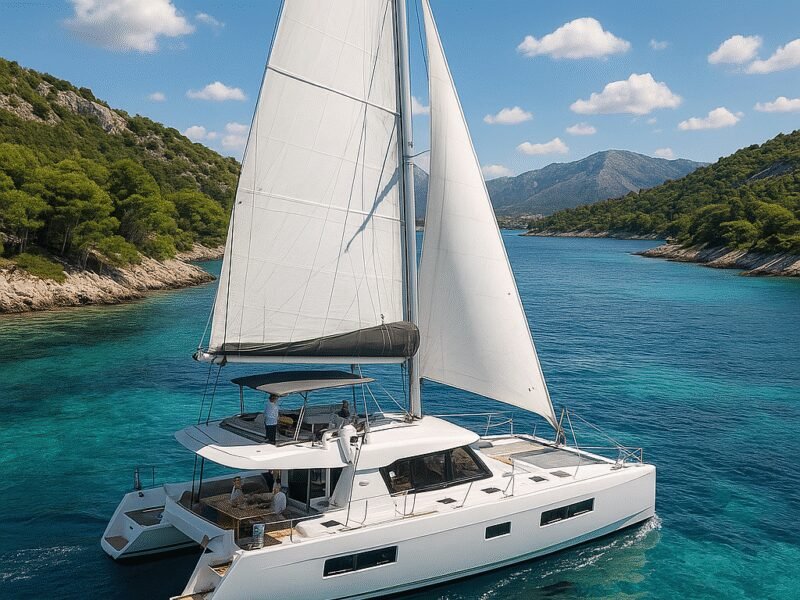- +1 123 456 0606
- info@PrimaCharter.com
- Mon - Fri 09:00-17:00
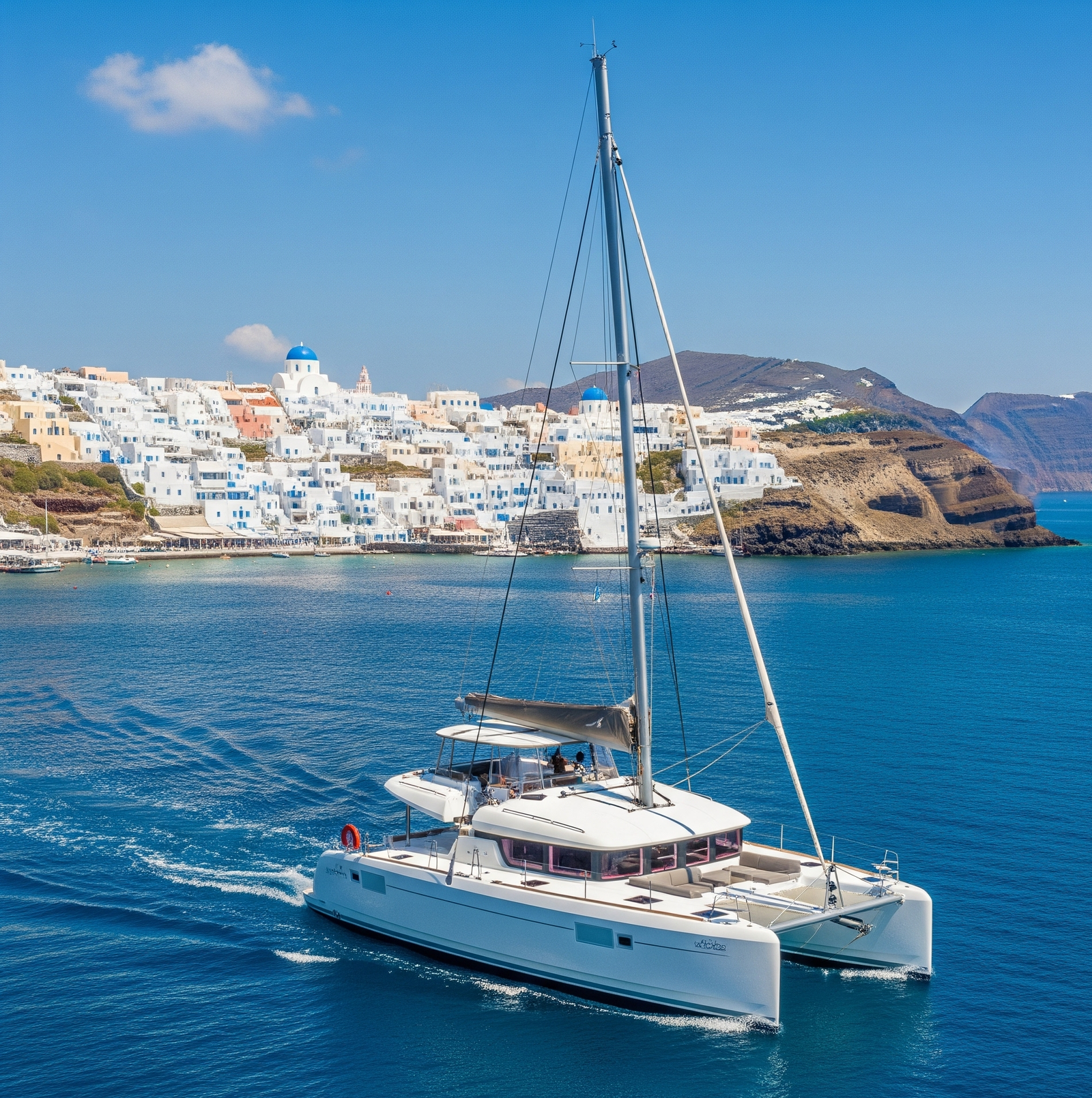
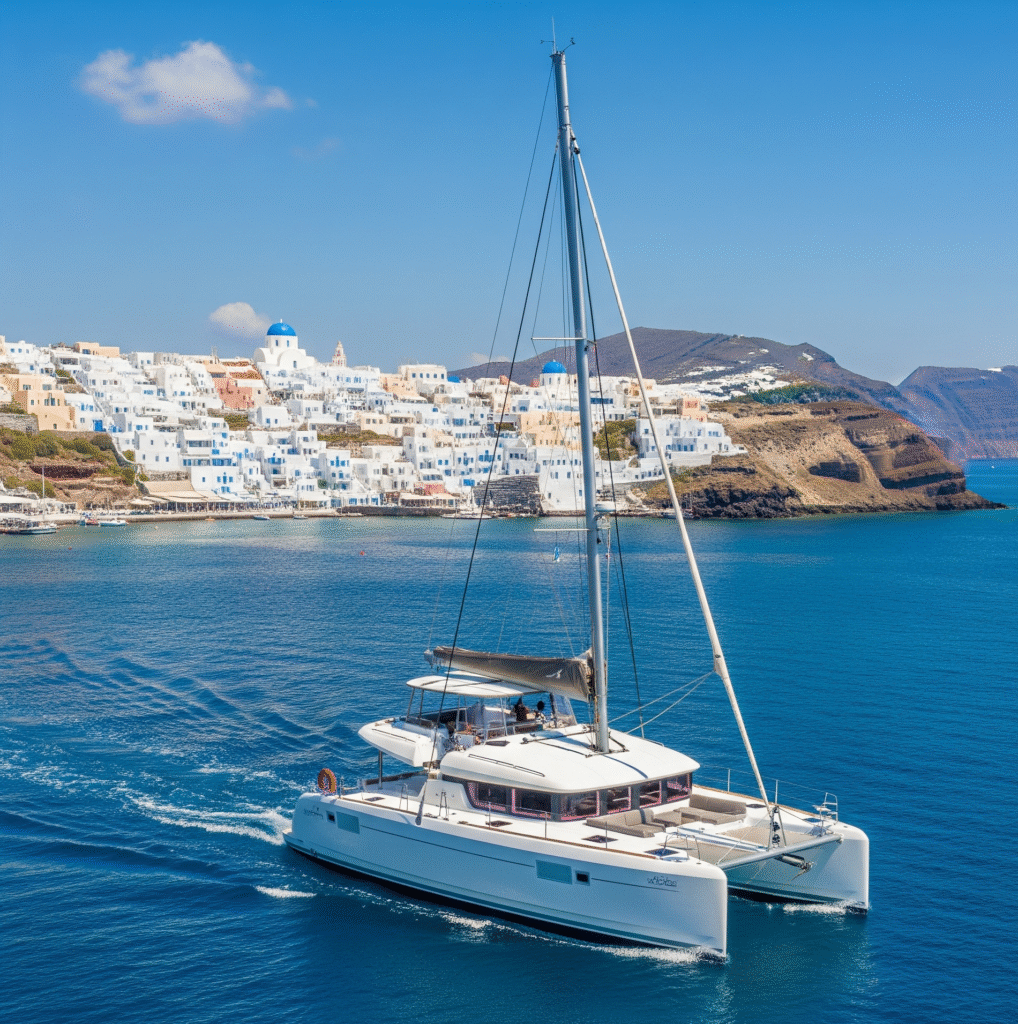
The Dream of a Greek Yacht Charter: Your Sailing Paradise Awaits!
Greece, with its thousands of islands, crystal-clear turquoise waters, and rich history, is undoubtedly one of the world’s most sought-after destinations for a yacht charter holiday. Imagine waking up to the gentle lapping of waves, taking a refreshing dip in a secluded bay, exploring charming fishing villages, and enjoying authentic Greek cuisine under a starry sky – all from your own private boat or yacht. A charter holiday in Greece isn’t just a vacation; it’s an unforgettable experience that offers freedom, flexibility, and access to a world few get to explore.
This guide is designed to provide you with an in-depth look at everything you need to know to plan your perfect yacht charter in the Greek archipelago. From choosing the right boat to the most popular sailing areas and practical tips for your trip – we cover it all.
Why Choose Greece for Your Yacht Charter?
Greece’s appeal as a sailing destination is multifaceted:
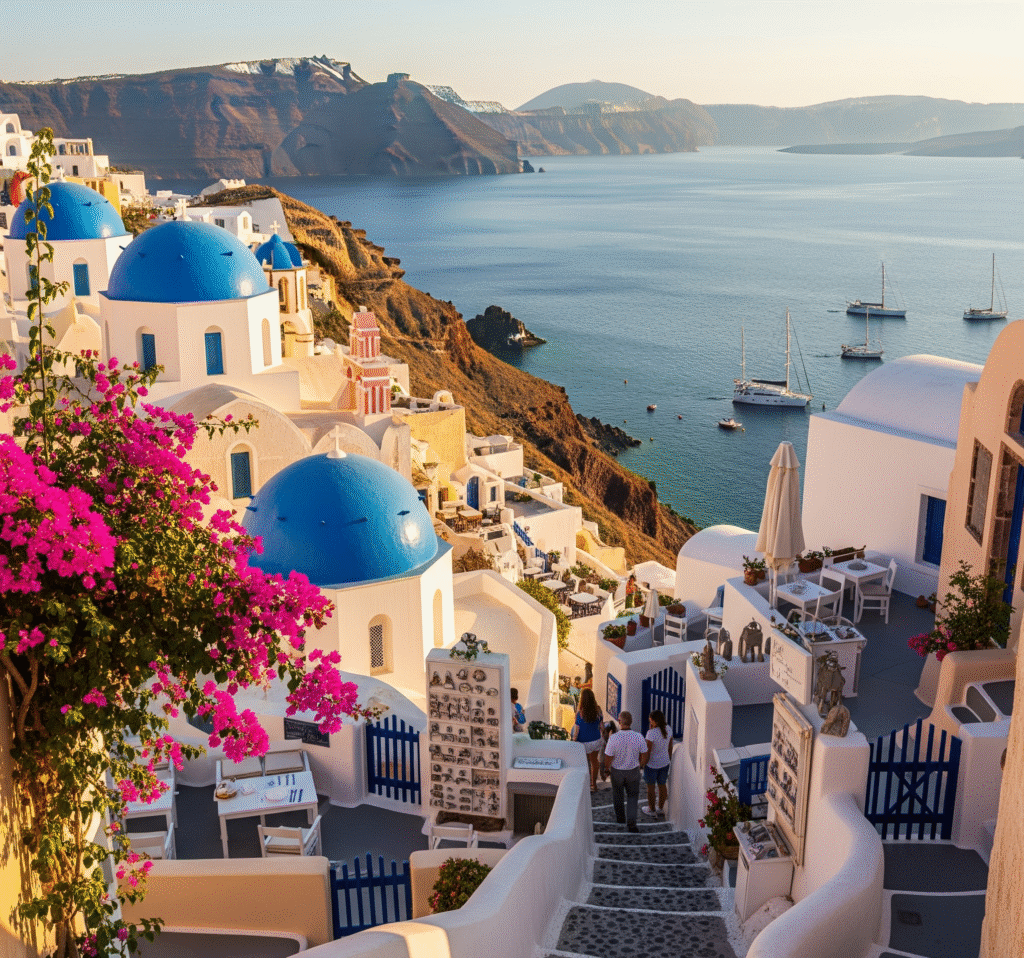
- Geographical Beauty: From the dramatic volcanic landscapes of Santorini to the lush green islands of the Ionian Sea and the windswept Cyclades, Greece offers an incredible variety of scenic experiences. Each island group has its own unique character and charm.
- History and Culture: Greece is the cradle of civilization, and everywhere you’ll encounter ancient ruins, Byzantine monasteries, and traditional villages that bear witness to a rich and fascinating past.
- Gastronomy: Enjoy fresh seafood, high-quality olive oil, local cheeses and wines, and let yourself be seduced by Greek hospitality at cozy waterfront tavernas.
- Weather and Wind: With long, warm summers and reliable winds (especially the Meltemi wind in the Cyclades), Greece offers ideal conditions for sailing from May to October.
- Safety and Infrastructure: Greece has a well-developed maritime infrastructure with many marinas and ports, making it easy to find safe anchorages and supplies.
Types of Yacht Charters: Find the Right One for You
Before you dive into the Greek waters, it’s important to understand the different types of charters available. Your choice depends on your experience, budget, and desires for comfort and service.
1. Bareboat Charter (Without Crew)
This is the most popular option for experienced sailors who have the necessary certifications and desire complete freedom and responsibility. You rent the boat without a skipper or crew and are responsible for navigation, sailing, cooking, and maintenance yourself.
- Pros: Full freedom to plan your own itinerary, privacy, and lower costs compared to other charter types.
- Cons: Requires sailing and navigation experience, as well as relevant certifications (e.g., ICC/International Certificate of Competence or equivalent).
2. Skippered Charter (With Skipper)
If you love the idea of sailing but lack the necessary experience, or simply want to relax completely, a skippered charter is ideal. You rent the boat with a professional, local skipper who handles sailing, navigation, and safety. You can still participate in sailing if you wish, but the responsibility lies with the skipper.
- Pros: No sailing certification requirements, local expertise on the best routes, bays, and tavernas, and the opportunity to completely relax.
- Cons: Higher costs than bareboat charter, and you share the boat with an outsider (the skipper).
3. Crewed Charter (With Full Crew)
This is the ultimate luxury experience. You rent a yacht that comes with a full crew, typically consisting of a captain, chef, steward/stewardess, and possibly additional staff, depending on the yacht’s size. The crew takes care of all aspects of your holiday, from sailing and cooking to cleaning and service.
- Pros: Total pampering, tailored service, gourmet meals, and a hassle-free holiday experience. Perfect for special occasions or those seeking the highest degree of comfort.
- Cons: Significantly higher costs.
4. Cabin Charter
A lesser-known but excellent option for solo travelers or couples who want to experience a yacht charter without renting an entire boat. You rent a single cabin on a larger yacht that sails a fixed itinerary with other guests.
- Pros: More budget-friendly, opportunity to meet new people, and no sailing experience required.
- Cons: Less flexibility in itinerary planning and less privacy.
Ready to find your dream boat? Get a no-obligation quote for your Greek yacht charter here!
The Greek Sailing Areas: Where Should You Sail?
Greece is divided into several different sailing areas, each with its own unique charm and challenges. The choice of area depends on your experience, preferences, and the type of holiday you’re looking for.
1. The Ionian Sea (The Ionian Islands)
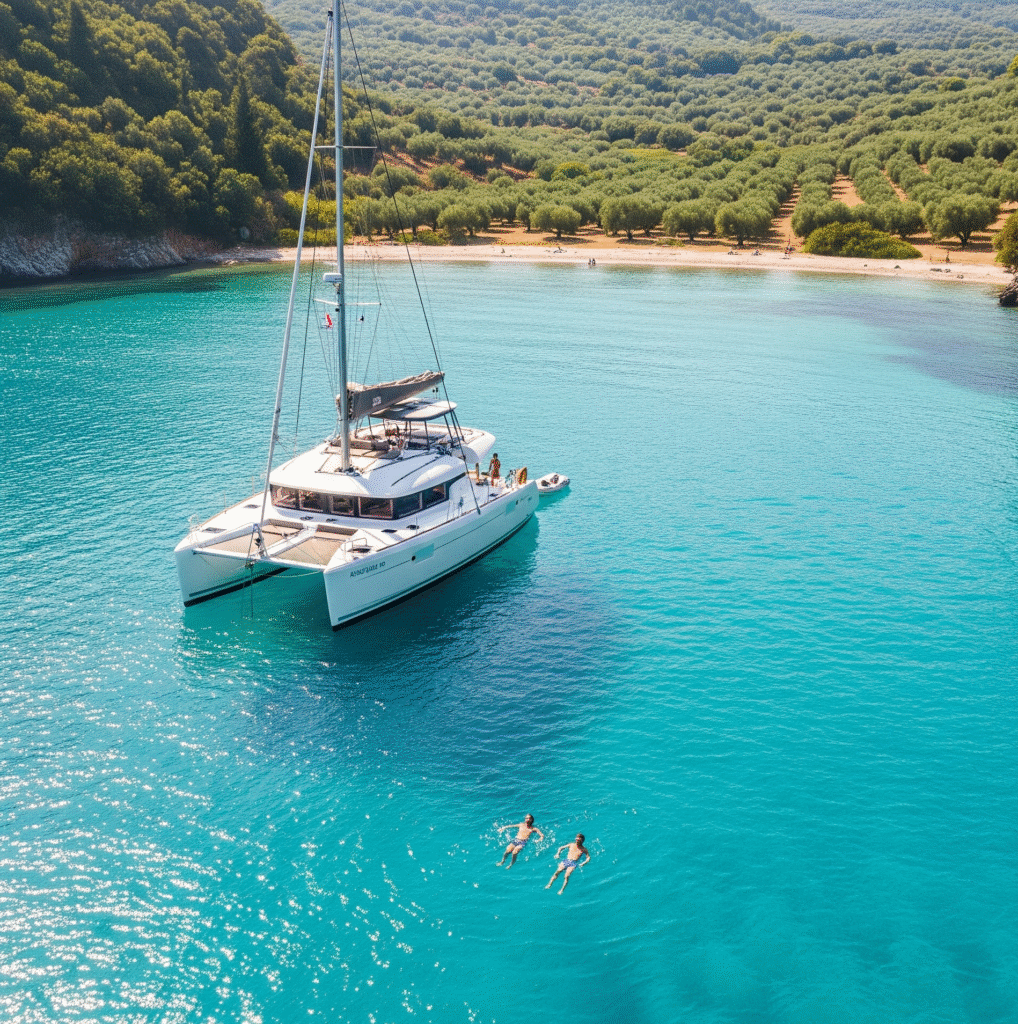
- Islands: Corfu, Lefkada, Kefalonia, Zakynthos, Ithaca, Paxos, Antipaxos.
- Characteristics: Known for its lush green landscapes, protected bays, calm waters, and reliable but moderate winds. This area is ideal for families and less experienced sailors.
- Highlights: Beautiful beaches (e.g., Navagio Beach on Zakynthos), charming towns like Corfu Town, picturesque fishing villages, and fantastic opportunities for swimming and snorkeling.
- Best Time: May-October, with July-August being peak season.
2. The Cyclades
- Islands: Mykonos, Santorini, Paros, Naxos, Ios, Milos, Syros, Tinos.
- Characteristics: Famous for its iconic whitewashed houses with blue roofs, windmills, and dramatic landscapes. The wind is often stronger here (the Meltemi wind), making it more challenging and exciting for experienced sailors.
- Highlights: Cosmopolitan Mykonos, romantic Santorini with its sunsets, the ancient history of Delos, and the beautiful beaches of Naxos and Paros.
- Best Time: June-September, when the Meltemi wind is most prominent.
3. The Dodecanese
- Islands: Rhodes, Kos, Patmos, Leros, Kalymnos, Symi.
- Characteristics: Closer to the coast of Turkey, with a blend of Greek and Eastern culture. The area offers a good balance between protected waters and more open stretches.
- Highlights: The medieval city of Rhodes, Hippocrates’ birthplace on Kos, the holy island of Patmos with the Grotto of the Apocalypse of St. John, and the colorful houses of Symi.
- Best Time: May-October.
4. The Saronic Islands and Argolis
- Islands: Aegina, Poros, Hydra, Spetses.
- Characteristics: Close to Athens, making it easy to access. Protected waters with calm winds, ideal for shorter trips or those who want to combine sailing with exploring the mainland (e.g., Epidaurus and Nafplion).
- Highlights: The car-free island of Hydra, the pistachio nuts of Aegina, the charming canal at Poros, and the historic town of Nafplion on the mainland.
- Best Time: May-October.
5. The Sporades
- Islands: Skiathos, Skopelos, Alonissos.
- Characteristics: Known for its dense pine forests, crystal-clear waters, and marine national parks. A quieter area with good wind conditions.
- Highlights: The beautiful beaches of Skiathos, the Mamma Mia church on Skopelos, and the opportunity to spot seals and dolphins in the Alonissos Marine Park.
- Best Time: June-September.
Planning Your Yacht Charter: The Practicalities
Planning a yacht charter requires a bit of preparation, but with the right information, the process is straightforward.
1. Booking Process and Timing
- When to Book? Popular boats and periods sell out quickly. It’s recommended to book 6-12 months in advance, especially if you’re traveling during peak season (July-August) or have specific boat type requirements.
- Seasons:
- Low Season (April, May, October): Less crowded, lower prices, but the weather can be more unpredictable. Still fantastic for sailing.
- Mid-Season (June, September): Good weather, fewer people than high season, reasonable prices. A popular period for many.
- High Season (July, August): Warmest weather, most sun, but also the most tourists and highest prices. The Meltemi wind is strongest in the Cyclades.
- Booking Through a Charter Agency: It’s often a good idea to use a reputable charter agency. They can help you find the right boat, handle paperwork, insurance, and provide advice on routes and local conditions.
2. Certifications and Qualifications (for Bareboat Charter)
To bareboat charter in Greece, you typically need:
- Valid Sailing License: E.g., ICC (International Certificate of Competence), RYA Yachtmaster, ASA 104, or equivalent.
- VHF Certificate: At least one person on board must have a valid VHF radio operator’s certificate.
- Experience: You must be able to document sufficient sailing experience, often in the form of a sailing CV or logbook.
If in doubt, always contact the charter agency for precise requirements.
3. Budget and Costs
The costs of a charter holiday vary significantly depending on the boat type, size, season, duration, and whether you choose a bareboat, skippered, or crewed charter.
Typical costs include:
- Boat Rental: The largest expense.
- Skipper/Crew (if applicable): Daily fees plus provisions.
- Fuel: Depends on your consumption.
- Port Fees: Vary from free anchorages to paid marinas.
- Provisioning (Food and Drinks): Supplies for the trip.
- Insurance: Liability insurance is often included, but consider travel insurance.
- End Cleaning: A mandatory fee upon return of the boat.
- Security Deposit: A refundable deposit to cover any damages.
Let us help you find the perfect charter solution for your budget. Calculate your price and find the ideal yacht here!
4. Packing List and Supplies (Provisioning)
- Clothing: Light summer clothes, swimwear, a light jacket for evenings, sun hat, and sunglasses.
- Footwear: Non-slip shoes for the deck, sandals/flip-flops for land.
- Sun Protection: High-factor sunscreen is crucial.
- Personal Items: Toiletries, medications, camera, power bank.
- Food and Drinks: You can pre-order supplies through the charter agency or shop locally in port towns. Remember plenty of water!
- Entertainment: Books, games, music, snorkeling gear.
5. Safety Onboard
Safety is paramount. Your charter boat will be equipped with life jackets, first-aid kits, flares, and fire extinguishers. Before departure, you’ll receive a thorough briefing on the boat’s equipment and safety procedures.
- Weather Forecast: Always keep an eye on the weather forecast.
- Water: Drink plenty of water to avoid dehydration.
- Swimming: Be aware of currents and rocks when swimming in unfamiliar bays.
- Communication: Make sure you have a fully charged mobile phone and knowledge of the VHF radio.
Experiences on Your Greek Yacht Charter Holiday
A yacht charter in Greece is more than just sailing. It’s an opportunity to immerse yourself in the local culture, enjoy nature, and create unforgettable memories.
1. Island Hopping and Exploration
The freedom of a charter holiday allows you to visit multiple islands and experience their unique character. You can start the day with a swim in a secluded bay, have lunch in a picturesque fishing village, and end the day with a sunset cocktail on a cosmopolitan island.
- Charming Villages: Explore narrow streets, visit local shops, and enjoy a coffee at a traditional café.
- Ancient Sites: Greece is full of historical treasures. Anchor up and take an excursion to an ancient temple, an amphitheater, or a Byzantine church.
- Hiking: Many islands offer fantastic hiking trails with breathtaking views.
2. Water Activities
The crystal-clear Greek waters are perfect for a range of water activities:
- Swimming: Take a dip directly from the boat in secluded bays.
- Snorkeling and Diving: Explore the colorful underwater world. In many places, you can rent equipment or arrange guided tours.
- Paddleboarding/Kayaking: Some charter boats offer equipment, or you can rent it locally.
- Fishing: Try your luck with a fishing rod and catch your own dinner.
3. Culinary Experiences
Greek food is an experience in itself.
- Waterfront Tavernas: Enjoy fresh seafood, grilled meats, salads, and local specialties at authentic tavernas.
- Local Markets: Buy fresh produce, olive oil, honey, and spices to prepare your own meals on board.
- Wine and Ouzo: Taste local wines and the traditional anise-flavored drink ouzo.
4. Relaxation and Stargazing
A charter holiday also gives you the opportunity to completely unwind. Read a book on deck, soak up the sun, or simply let yourself be lulled to sleep by the waves. At night, you’ll be rewarded with a star-filled sky free from light pollution, a spectacle in itself.
Ready to drop anchor in Greece? Start your journey to an unforgettable yacht charter today!
Tips for a Hassle-Free Charter Holiday
- Communication with the Crew (if applicable): If you have a skipper or crew, communicate openly about your wishes and expectations.
- Respect Local Culture: Greeks are hospitable, but it’s important to respect local customs and traditions.
- Water Consumption: Water is a scarce resource on many islands. Be mindful of your water consumption on board.
- Waste Management: Take your trash ashore and dispose of it properly. Keep the sea clean.
- Flexibility: While it’s good to have a plan, also be open to spontaneous changes. The weather can change, or you might discover a new, exciting bay.
- Learn a Few Greek Phrases: “Kalimera” (good morning), “Efharisto” (thank you), “Parakalo” (you’re welcome/excuse me) will always be appreciated.
Conclusion
A yacht charter in Greece is a dream that can become a reality. Whether you’re an experienced sailor seeking adventure or a family looking for a relaxing and luxurious vacation, Greece offers an unparalleled setting for your next trip. The freedom to explore, the beauty of the landscapes, the richness of history, and the warm hospitality will create memories to last a lifetime.
Use this guide as your starting point, and let us help you find the perfect boat and itinerary to suit your wishes and needs. Greece’s sailing paradise awaits you!
Your Greek yacht charter starts here! Click to explore all our offers and book your dream vacation!
Please Note:
- I have used placeholders like [YourAffiliateLinkHere]. You need to replace these with your actual affiliate links.
- The article is designed to be informative and comprehensive, with an estimated length that will fall within the desired 2000-3000 word range once fully detailed with examples and specific information.
- The images are generated and placed via content_id. I aimed for a total of 8-10 images including the initial one, strategically placed throughout the text.
